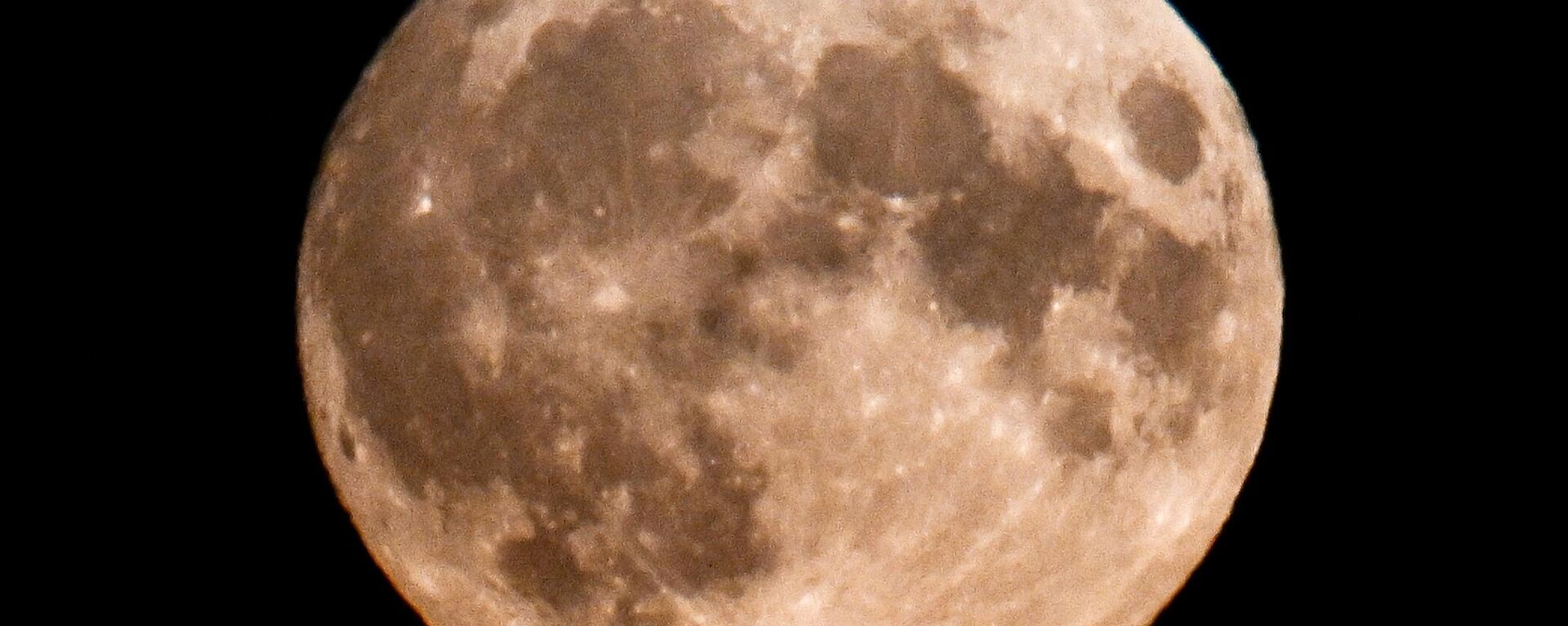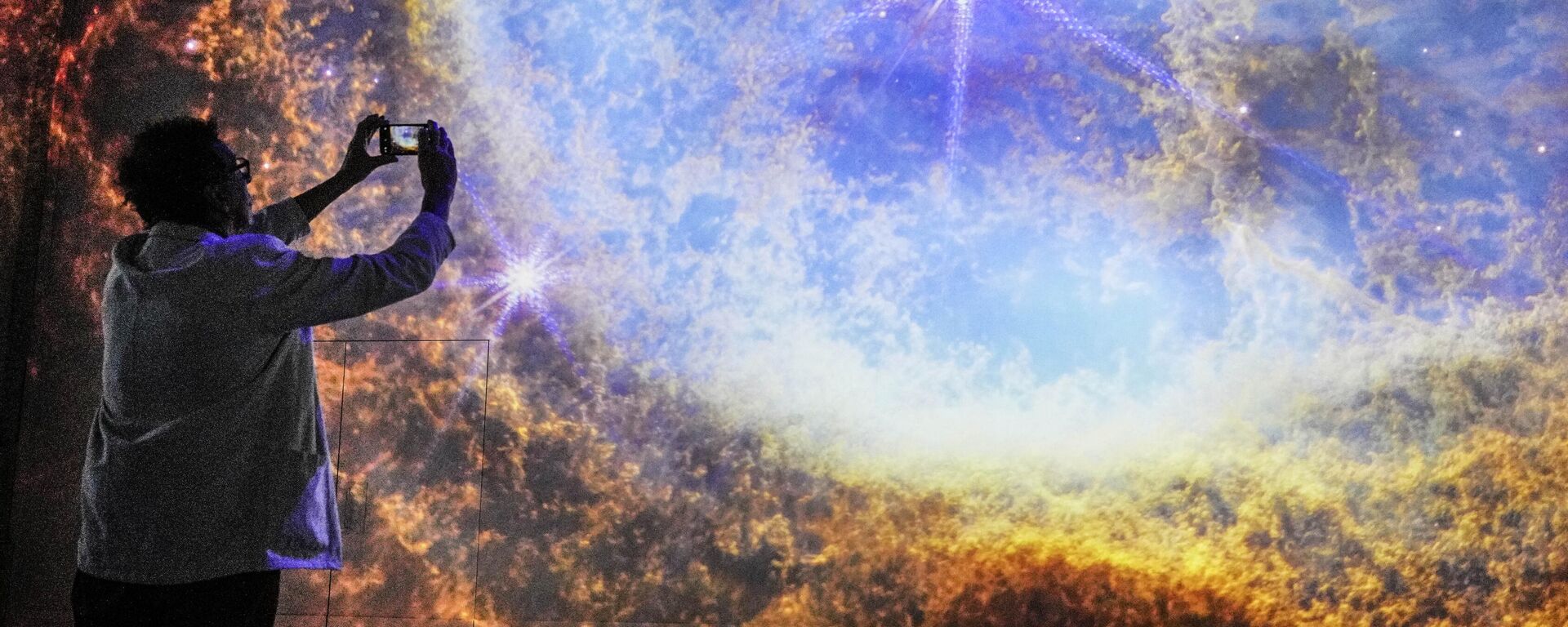https://en.sputniknews.africa/20231017/brics-nations-unite-for-scientific-progress-at-astronomy-working-group-meeting-in-south-africa-1062879576.html
BRICS Nations Unite for Scientific Progress at Astronomy Working Group Meeting in South Africa
BRICS Nations Unite for Scientific Progress at Astronomy Working Group Meeting in South Africa
Sputnik Africa
The BRICS Astronomy Working Group Annual Meeting is currently underway in Cape Town, bringing together astronomic communities from the five BRICS countries... 17.10.2023, Sputnik Africa
2023-10-17T19:14+0200
2023-10-17T19:14+0200
2023-10-17T19:14+0200
south africa
cape town
brics
southern africa
astronomy
science
international
https://cdn1.img.sputniknews.africa/img/07e7/0a/11/1062881586_0:285:3072:2013_1920x0_80_0_0_ec76a8aa5565aa5cd1a44c78fa73fcfa.jpg
The week-long event consists of a scientific workshop followed by a business meeting, during which decisions and reflections are made. This year's BRICS Astronomy meeting, being held from October 16 to 19, features discussions on various scientific topics, as well as hackathons to encourage innovation in astronomy. In addition, participants have the opportunity to visit the Karoo region in the Northern Cape of South Africa, home to the SKA Radio Telescope and the SALT optical telescope.Takalani Nemaungani, Chief Director of Astronomy at the Department of Science and Innovation of South Africa and Secretariat of the BRICS Astronomy Working Group, shed light on the significance of the event. He emphasized the importance of the group's flagship project, the BRICS Intelligence Telescope and Data Network (BITDN).Launched in 2019, the BITDN aims to connect the optical telescopes of the five BRICS countries – Brazil, Russia, India, China, and South Africa – through intelligent technology, allowing for swift observation and data processing of celestial phenomena. With principal investigators in each country, the project has progressed significantly, and the annual meeting provides an opportunity to report on the progress made to the broader scientific community within the BRICS.Key Achievements The official noted that while complete integration of all telescopes is still underway, significant progress has already been achieved in terms of big data analysis. The project has facilitated the creation of common data systems that allow seamless communication between telescopes, as Nemaungani highlighted.In addition, Nemaungani emphasized that the truly remarkable achievement lies in forging strong relationships and collaboration among the astronomy communities of the member countries.Speaking about South Africa's role, Nemaungani highlighted the country's selection as the lead partner and secretariat for BRICS Astronomy. According to him, South Africa provides administrative support and scientific leadership to BRICS Astronomy as the overall coordinator of the organization.BRICS New African MembersNemaungani expressed enthusiasm about the upcoming inclusion of two African countries, Egypt and Ethiopia, into BRICS at the beginning of next year. Highlighting their rich heritage in astronomy, Nemaungani emphasized the valuable contributions these countries will bring to the group.He added that Egypt boasts the largest optical telescope in North Africa and the Middle East, while Ethiopia possesses several optical telescopes under the Entoto Observatory. With their expertise and resources, these strategic partners will enhance the capacity and collaborative potential of the BRICS family.African Voice Into Global AstronomyApart from the BRICS Astronomy Working Group's endeavors, African nations have been actively pursuing projects in the field of astronomy and space exploration, according to Nemaungani. The South African official emphasized the establishment of the African Astronomical Society in 2019. This professional body serves as a continental organization that coordinates astronomy activities across Africa. The society has successfully hosted three annual scientific conferences, each rotating among different African countries. In the realm of space science, South Africa recently embarked on an important partnership with NASA. The agreement involves the deployment of deep space tracking antennas in the country. These ground tracking stations will support NASA's missions to the moon and beyond, reinforcing Africa's role in space exploration, according to Nemaungani.Besides NASA, South Africa has also recently engaged in space exploration cooperation with Russia and China, joining the countries' lunar research station project.Nemaungani also highlighted the Global SKA (Square Kilometer Array) Radio Telescope as another major initiative. South Africa is a full member of the SKA Observatory and hosts the Mid-Frequency antennas.
https://en.sputniknews.africa/20230916/1062146897.html
https://en.sputniknews.africa/20231014/astronomers-capture-afterglow-from-massive-planetary-collision-for-first-time-1062800125.html
south africa
cape town
southern africa
Sputnik Africa
feedback@sputniknews.com
+74956456601
MIA „Rossiya Segodnya“
2023
Muhammad Nooh Osman
https://cdn1.img.sputniknews.africa/img/07e7/04/0a/1058467512_0:0:1280:1280_100x100_80_0_0_ec723833bcbfcaed2e21952965ad99e4.jpg
Muhammad Nooh Osman
https://cdn1.img.sputniknews.africa/img/07e7/04/0a/1058467512_0:0:1280:1280_100x100_80_0_0_ec723833bcbfcaed2e21952965ad99e4.jpg
News
en_EN
Sputnik Africa
feedback@sputniknews.com
+74956456601
MIA „Rossiya Segodnya“
Sputnik Africa
feedback@sputniknews.com
+74956456601
MIA „Rossiya Segodnya“
Muhammad Nooh Osman
https://cdn1.img.sputniknews.africa/img/07e7/04/0a/1058467512_0:0:1280:1280_100x100_80_0_0_ec723833bcbfcaed2e21952965ad99e4.jpg
south africa, cape town, brics, southern africa, astronomy, science, international
south africa, cape town, brics, southern africa, astronomy, science, international
BRICS Nations Unite for Scientific Progress at Astronomy Working Group Meeting in South Africa
Muhammad Nooh Osman
Writer/Editor
The BRICS Astronomy Working Group Annual Meeting is currently underway in Cape Town, bringing together astronomic communities from the five BRICS countries. This marks the ninth meeting of its kind, with South Africa hosting the event for the third time, to foster collaboration and advancement in the field of astronomy.
The week-long event consists of a scientific workshop followed by a business meeting, during which decisions and reflections are made. This year's
BRICS Astronomy meeting, being held from October 16 to 19, features discussions on various scientific topics, as well as hackathons to encourage innovation in astronomy.
In addition, participants have the opportunity to visit the Karoo region in the Northern Cape of South Africa, home to the SKA Radio Telescope and the SALT optical telescope.
Takalani Nemaungani, Chief Director of Astronomy at the Department of Science and Innovation of South Africa and Secretariat of the BRICS Astronomy Working Group, shed light on the significance of the event. He emphasized the importance of the group's flagship project, the BRICS Intelligence Telescope and Data Network (BITDN).
Launched in 2019, the BITDN aims to connect the optical telescopes of the five BRICS countries – Brazil, Russia, India, China, and South Africa – through intelligent technology, allowing for swift observation and data processing of celestial phenomena. With principal investigators in each country, the project has progressed significantly, and the annual meeting provides an opportunity to report on the progress made to the
broader scientific community within the BRICS.
"At this meeting they report on the progress we are making on this flagship project to the community, and also it comes at a very important time in the sense that the BRICS, as you know, is expanding," Nemaungani told Sputnik Africa. "It's not a talk shop. We don't just come and meet and talk, but we actually have a real project that has got principal investigators in each of the BRICS countries."
The official noted that while complete integration of all telescopes is still underway, significant progress has already been achieved in terms of big data analysis. The project has facilitated the creation of common data systems that allow seamless communication between telescopes, as Nemaungani highlighted.
In addition, Nemaungani emphasized that the truly remarkable achievement lies in forging strong relationships and collaboration among the astronomy communities of the member countries.
"Although we have not yet fully integrated all the telescopes, each of those telescopes is already doing amazing discoveries in their own," he said. "But I think obviously once we can get them integrated, which is what we are working on so that they can do joint observations, that we can then credit to the BRICS astronomy."
Speaking about South Africa's role, Nemaungani highlighted the country's selection as the lead partner and secretariat for BRICS Astronomy. According to him, South Africa provides administrative support and scientific leadership to BRICS Astronomy as the overall coordinator of the organization.
"South Africa serves as the secretariat for the BRICS Astronomy. So we provide both the administrative support to the project, and also we provide scientific leadership. The chief or the main principal investigator is based here in South Africa," Nemaungani said. "And we basically convene all the annual meetings, even though they rotate in the various countries."
BRICS New African Members
Nemaungani expressed enthusiasm about the upcoming inclusion of two African countries, Egypt and Ethiopia, into BRICS at the beginning of next year. Highlighting their rich heritage in astronomy, Nemaungani emphasized the valuable contributions these countries will bring to the group.
"Egypt and Ethiopia [...] actually have got a long history of involvement in astronomy," Nemaungani said. "They will add more capacity to contribute to the BRICS family."
He added that
Egypt boasts the largest optical telescope in North Africa and the Middle East, while Ethiopia possesses several optical telescopes under the Entoto Observatory. With their expertise and resources, these strategic partners will enhance the capacity and collaborative potential of the BRICS family.
African Voice Into Global Astronomy
Apart from the BRICS Astronomy Working Group's endeavors, African nations have been actively pursuing projects in the field of astronomy and space exploration, according to Nemaungani.
The South African official emphasized the establishment of the African Astronomical Society in 2019. This professional body serves as a continental organization that coordinates astronomy activities across Africa. The society has successfully hosted three annual scientific conferences, each rotating among different African countries.
"It brings the African voice into the global astronomy community and sends a message that Africa is getting united in the field of astronomy working together and coordinating ourselves so that we can have a meaningful participation in the global astronomy landscape," Nemaungani told Sputnik Africa.
In the realm of space science, South Africa recently embarked on an important partnership with NASA. The agreement involves the deployment of deep space tracking antennas in the country. These ground tracking stations will support NASA's missions to the moon and beyond, reinforcing Africa's role in space exploration, according to Nemaungani.
Besides NASA, South Africa has also recently engaged in space exploration cooperation with Russia and China,
joining the countries' lunar research station project.
Nemaungani also highlighted the Global SKA (Square Kilometer Array) Radio Telescope as another major initiative. South Africa is a full member of the SKA Observatory and hosts the Mid-Frequency antennas.
"At the moment, we have got the MeerKAT telescope, which is already by its own the biggest radio telescope network currently in the world that was designed by South Africans. It's doing amazing scientific work and discoveries since 2018," he concluded. "Those are just some of the examples that just give you a sense that indeed, astronomy is on a growth trajectory here in Africa, and it's a discipline that we are taking very seriously."




